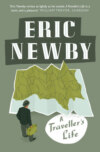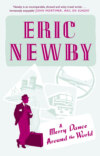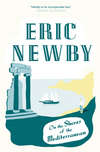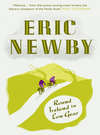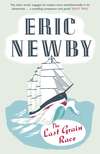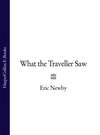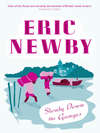Czytaj książkę: «A Traveller’s Life»

ERIC NEWBY
A Traveller’s Life

Dedication
ToMy Fellow Traveller
Contents
Cover
Title Page
Dedication
List of Illustrations
Introduction
1. Birth of a Traveller (1919)
2. The Baby as a Traveller
3. Rings Around the Tombs in SW13 (1923)
4. Travels in Harrods
5. Westward Ho! (1925)
6. A Walk in the Sun (1925)
7. Journeys Through Darkest Hammersmith (1928–36)
8. Lands and Peoples
9. Mystery Tour (1927)
10. Something in West One (1936–8)
11. I Go to Sea (1938)
12. Snakes and Ladders (1939–42)
13. Love Among the Ruins (1942)
14. A Trip to Italy (1942)
15. Conducted Tours with the Third Reich (1944)
16. Götterdämmerung (1944–5)
17. Commercial Traveller (1946–54)
18. Travels in My Imagination (1947)
19. When Did You Last Cross the Oxus? (1956)
20. The Most Unforgettable Character I Never Met (1958)
21. A Visitor from Lhasa (1958)
22. MG Buyer (1960–3)
23. Down the Drain (1963)
24. A Princely Shoot (1963)
25. Lonely Islands (1964)
26. New York (1965)
27. A Walk on Broadway (1965)
28. Lawrence’s Jordan (1967)
29. Treetops, East Africa (1967)
30. Orient Express (1969)
31. The Pera Palace Hotel (1969)
32. A Journey in the Wilderness (1971)
33. Wimbledon to Italy by Bicycle (1971)
34. Port-au-Prince (1972)
35. Leaving The Observer (1973)
Acknowledgements
About the Author
Praise
Also by the Author
Plates
Copyright
About the Publisher
List of Illustrations
The traveller in his pram
My mother in our Napier car
My first unaccompanied travels
A mystery tour by charabanc
Storm in the Southern Ocean
Washing up in the port fo’c’sle
Wanda aged eighteen
On the run in Italy during the war
Myself aged twenty-three
Constantinople in the 1830s
Myself as fashion buyer, with Katharine Whitehorn (Desmond O’Neill)
On the island of Fara, Scapa Flow
Wanda descending the Ganges
Seen from the Istanbul Express, Bulgaria
Sheikh Ayid Awad Zalabin in Wadi Rumm
In the Pera Palace Hotel, Istanbul (Wanda Newby)
Myself relaxing at the Pera Palace Hotel
Bicycling from the Wash to Wimbledon (Chris Smith)
St Katharine’s Monastery, Mount Sinai
The favourite wife of Sheikh el Sheikh Abu Abdullah of the Umzeini Bedu (Wanda Newby)
Introduction
This book is not an autobiography. It concerns itself for the most part, as the title suggests, with my life as a traveller in however modest a fashion from the time I was born more than sixty years ago.
Some of these travels were in distant places, in what used to be referred to as ‘foreign parts’. But this is by no means true of all of them, and some of them were very near home indeed, for I agree with Ogden Nash’s more or less unassailable definition of what constitutes a foreigner and what is a foreign part:
The place you’re at
Is your habitat.
Everywhere else you’re a foreigner.
If you can bring yourself to believe this, it takes a lot of the sting out of the cost of travel; and it is why I felt it reasonable to include my journeys through Harrods – a strange early adventure which befell me and my somewhat oversexed nurse while she was propelling me in a baby carriage through a London suburb – as well as an account of some equally bizarre excursions into the underworld of the London sewers by night while working as a fashion buyer of dresses, retailing at ten guineas and upwards, for a chain of department stores during the day.
The somewhat episodic nature of the book is because one cannot continue going round the world for ever without intermissions in which one tries to make money, licks one’s wounds, and re-equips oneself for further ventures. Even a traveller such as the Arab Ibn Battuta, born at Tangier in 1304 – perhaps the greatest traveller of all time who, in the course of his life, was estimated to have covered seventy-five thousand miles not counting detours, the only medieval traveller who is known to have visited the lands of every Muhammedan ruler of his time, quite apart from such infidel countries as Ceylon and China – was not always on the go, taking time off to get married here and there or to act as a counsellor of moderation to a mad potentate. In fact, travellers such as those who go into orbit and fail to come out of it, or travellers like the Jew who spat at Christ at the crucifixion and was condemned to wander the world for ever, can only be regarded as exceptionally unfortunate.
In his writings, the Venerable Bede compared the span of human life to coming out of darkness into a lighted hall and, having reached the end of it, finding oneself under the necessity of setting off once more into the all-embracing gloom. To me life has been more like one of those sections of autostrada on the Italian Riviera, on which there are lots of tunnels, some long, some short, with sunlit open spaces of varying lengths between them for which the darkness leaves one temporarily dazzled and often unprepared.
Why do people travel? To escape their creditors. To find a warmer or cooler clime. To sell Coca-Cola to the Chinese. To find out what is over the seas, over the hills and far away, round the corner, over the garden wall – with a ladder and some glasses you could see to Hackney Marshes if it wasn’t for the houses in between, in the words of the old music hall song, the writer of which one feels was about to take off.
Why have I travelled? Difficult to answer, that is when not engaged in the equivalent of selling Coca-Cola to the Chinese (large size dresses in Leeds), or travelling as a sailor or a soldier. Partly, undoubtedly, for amusement and sheer curiosity and partly, as Evelyn Waugh wrote in the preface to a book I wrote which described a journey through the Hindu Kush, to satisfy ‘the longing, romantic, reasonless, which lies deep in the hearts of most Englishmen, to shun the celebrated spectacles of the tourist and, without any concern with science or politics or commerce, simply to set their feet where few civilized feet have trod’.
CHAPTER ONE Birth of a Traveller
(December 1919)
BIRTHS, MARRIAGES, DEATHS BIRTHS
NEWBY. – On the 6th December at 3 Castelnau Mansions, Barnes, SW13, to Hilda Newby, wife of Geo. A. Newby – a son.
In this extravagant fashion – altogether it cost 50p ($1.95),1 at a time when Lady Secretaries with shorthand and typing were earning around £3.50 ($13.65) a week – my arrival was announced on the following Tuesday, 9 December, in The Times and the Daily Telegraph, two of the daily newspapers my father ‘took in’ at that period. The other was the Daily Mirror, then a rather genteel paper, which he ordered for my mother, but never looked at himself, and which she passed on to the cook/housekeeper when she had finished with it. From then on it was also passed on to a nurse.
As an event my birthday can scarcely be said to have been one of great consequence except to my parents, their relatives and friends. What is perhaps more interesting, and I hope the reader may think so too, is what sort of day that now far-off Saturday in December 1919 turned out to be, and what was going on in the world beyond the windows of that first-floor flat in which I was born facing the Metropolitan Waterboard’s reservoirs and filter beds by the Thames on the Surrey side of Hammersmith Bridge.
At 3.45 a.m., the ghastly hour I chose, or rather the doctor chose, for my arrival – I had to be hauled out by the head – conditions must have been pretty beastly in Barnes. It was a dark and stormy night, with a fresh wind from the west whose gusts would have been strong enough to blow clouds of spray from the big reservoir (which was opposite our flat by the bridge and which has now been filled in to make playing fields for St Paul’s School) over the pavement and right across the main road (which was called Castelnau but which all the inhabitants knew and know to this day as Castlenore) as it always did when the wind was strong from that particular quarter, sometimes, but rarely at 3.45 a.m. wetting unwary pedestrians and people travelling in open motor cars.
And it was certainly dark, although the moon had been up for more than thirteen hours and was only a day off full. It would be nice, more romantic, altogether more appropriate for a potential traveller, to think of myself arriving astride the Centaur, and, Sagittarius being in the ascendant, perhaps carrying the latter’s arrows for him, as we moved across a firmament in which ragged clouds were racing across the path of a huge and brilliant moon; but it was not to be. It was ordained that I should be a child not only of darkness but of utter darkness, of ten-tenths cloud.
It was not much of a night for the distinctly grumpy, and, from what I subsequently gathered from my mother, very pompous Harley Street gynaecologist to be out, summoned from his residence in Hampstead to this distant and unfashionable address at 2 a.m. by my father, using the telephone which he had had installed expressly for this contingency. On the other hand, it could have been colder. At 4 a.m. the thermometer at Kensington Palace, a couple of miles away on the other side of Hammersmith Bridge, registered a temperature well above freezing in the 40s Fahrenheit.
This ‘specialist’ subsequently performed an operation on my mother so incompetently and, so far as there was any possibility of her having any more children, so definitively, that years later the operation became the subject of a highly critical article in one of the medical periodicals in which my mother was referred to as Mrs N and the surgeon as Mr X, by which time he was dead and beyond the processes of the Law. That night he travelled to Barnes in what my father described to me when I was old enough to be curious about the circumstances of my birth as ‘an electric brougham’.
The driver of such a machine sat outside, perched high up on a box, fully exposed to the elements – which would have been necessary if he had been driving a horse – while the passengers were accommodated in its leather upholstered and buttoned interior in considerable comfort. And, in fact, the effect produced by one of these contraptions, which looked as if its horse had bolted without it but was still moving forward by the force of gravity, steered by its gloomy, peak-capped driver with a wheel on a vertical column (gloomy because for most of his life he had probably driven horse-drawn broughams and regarded this development as an affront to nature), was highly comical. And when I eventually travelled in an electric brougham, aged five, on a night of thick pea soup fog and torrential rain in December 1924, from my grandparents’ house in Winchester Street, Pimlico, back to Hammersmith Bridge, with my mother and father and an uncle and aunt, all warm and dry and full of food inside, while the driver was drenched with rain and half asphyxiated by fog on the outside, I laughed till I cried, all the way shrieking, ‘He hasn’t got a lid on!’
It was my mother, who was in a position to feel the full force of the specialist’s grumpiness, who told me about it. However, why he was grumpy when he was being paid so highly for something he had contracted to do, and was treated to whisky on his arrival and champagne on my arrival, as well as chicken sandwiches, is not clear. Presumably the nature of his job must have accustomed him to working at odd hours, like lighthouse keepers and policemen. His grumpiness, however, was as nothing compared with that of another telephone subscriber to whose number my father was connected in error before getting through to the specialist, the work of one of the operators at the Hammersmith Exchange, whose fruity ‘SORRRYY YOU’VE BEEN TRRROUBBLED!’ did nothing to convince the wretched man, dragged from his bed at two in the morning, that anyone was sorry at all.
It would not have been much of a night for the homeless poor, their clothes stuffed with newspaper, who slept rough on the towing path down by the river all through my early childhood, and who would certainly have been there that night. Most of them were regulars. Some were terrifying-looking women; some were ‘tramps’, the first ‘real’ travellers I can remember seeing, pointed out by my nurse. But not many of them would have been tramps because most tramps were too solicitous of their personal comfort to share the appallingly draughty, unspeakably filthy but more or less rain-proof camping place used by these unfortunate outcasts, up against the reeking abutments under Hammersmith Bridge, only about fifty yards from where, a boisterous baby, I was now giving tongue. But on this particular night with a high spring tide some time after midnight (high water at London Bridge was at 12.12 a.m.) their pitch would have been a couple of feet under water for an hour or more, and they would have been sleeping among the bushes down towards Putney, or up against the trunks of the huge black poplar trees that grew along the towing path opposite Chiswick Mall further upstream to which normal spring tides did not reach.
Some of these men and women drank methylated spirits. If they became violent, they were ‘taken into custody’ by the police. This usually meant that a couple of unfortunate constables, sometimes one alone, had to strap the prisoner, male or female, who by this time would probably be striking out, biting and scratching, to a handcart and then wheel it a mile or more up Lonsdale Road from the Boileau Arms, which everyone called, and still calls, ‘Ther Boiler’, to Barnes Police Station with the occupant roaring loudly enough to wake the dead. If more than one person had to be taken into custody, a Black Maria was sent for.
When it dawned, the day was even more rumbustious than the night. And when the sun rose, just before eight o’clock, like the moon, it remained invisible. Thunderstorms visited many parts of the country, accompanied by hail, sleet or snow and west or north-westerly winds which reached gale force in high places. In Lincolnshire, the Belvoir Hunt, having ‘chopped a fox’ in Foston Spinney (seized it before it fairly got away from cover), ‘were hunting another from Allington when scent was totally swept away by a tremendous rainstorm’.
‘Flying Prospects’ on my birthday were not good, according to The Times. It is now difficult to imagine that a pilot, or even a passenger, might actually buy a newspaper in order to find out whether it was safe to ‘go up’, but it must have been so, otherwise there would have been no point in publishing the information at all. ‘Unsuitable for aviation or fit only for short distance flying by the heaviest sort of machine’ was what the communiqué said. ‘Sea Passages’ were equally disagreeable. The English Channel was rough, with winds reaching forty miles an hour, and there was extensive flooding in France.
But if the weather was disturbed that Saturday, it was as nothing compared with the state of great chunks of Europe and northern Asia. In spite of the fact that the advertising department of The Times had chosen this particular Saturday to announce ‘PRESENTS SUGGESTIONS FOR THE GREAT PEACE CHRISTMAS’, on it Latvians were fighting Germans, on whom they had declared war a week previously on 28 November, and so were the Lithuanians. In Russia, on the Don and between Voronezh and Kirsk and in Asia, beyond the Urals, along the line of the Trans-Siberian Railway, where typhus was raging, Bolsheviks and White Russians were engaged in a civil war of the utmost ferocity. Meanwhile, that same Saturday, while their fellow countrymen were destroying one another, with their country in ruins and becoming every day more ruinous, Lenin and Trotsky and the 1109 delegates of the Seventh All-Russian Congress of Soviets passed a resolution to the effect that ‘The Soviet Union Desires to Live in Peace with All Peoples’. On that day, too, Lenin told the Congress that ‘Communistic Principles were being utterly disregarded by the Russian peasantry.’
That day, too, much nearer home, while I was taking my first nourishment, as it were, in the open air, French Army units with heavy guns were rumbling across the Rhine bridges in order to force the Germans to ratify the peace treaty which they had signed at Versailles in June; and in the same issue of The Times which carried the headline about ‘THE GREAT PEACE CHRISTMAS’, there were other headlines such as ‘GUNS ACROSS THE RHINE’ and ‘WAR IMMINENT’, although who was to fight another war with millions killed and wounded, armies in a state of semi-demobilization, and millions more dying or soon to die from sickness and starvation was not clear. Nevertheless, that weekend, the only thing, theoretically, that stood between the protagonists and another outbreak of war, was the Armistice, signed in a French railway carriage parked in a wood, thirteen months previously, so that, equally theoretically, it would simply have meant carrying on with the old one. That weekend, too, the Americans quitted the peace conference.
There was, altogether, a lot about death in the papers that Saturday. It was as if Death the Reaper, an entity embodied by cartoonists in their drawings as a hideous, skeletal figure, and it would have been difficult to have lived through the last five years without thinking of death as such, had become dissatisfied with his efforts, had once again sharpened his scythe and was already cutting fresh, preliminary swathes through the debilitated populations of the vanquished powers, as if the great influenza epidemic, which reached its peak in Britain in March 1919, and which altogether killed more people in Europe than all the shot and shell of four and a half years of war, had not been enough.
In Britain, that Saturday, things were rather different. Bank rate was six per cent, exports were booming. On Friday, the US dollar closed at $3.90 to the pound. The only disquieting news that morning, and that was more or less a rumour, was that there was a possibility of a number of pits being forced to close in the South Wales anthracite fields.
Altogether, for many people that Saturday, life seems to have gone on much as it had done before the Deluge. Giddy and Giddy, House Agents, offered a luxuriously furnished town house, facing Hyde Park, with thirteen bed and dressing-rooms for £26.25 ($102.40) a week. Harrods announced Laroche champagne, 1911, the last vintage generally available (shipped) since the war, at £6.50 ($25.35) a dozen. Very old vintage port (Tuke Holdsworth) was £4.50 ($17.55) a dozen. Not advertised in The Times or the Daily Telegraph, but still listed in Harrods’ enormous current catalogue, (and for some years to come) under ‘Livery’, were red plush breeches for footmen.
Domestic servants were still comparatively inexpensive, although more difficult to find, than they had been before the war. That Saturday Lady Baldwin, of 37 Cavendish Square, advertised for a housemaid, ‘five maids and a boy kept, wages £28–£30 ($109–$117) a year’. And there were vacancies for live-in under nurses, at £25 ($97.50) a year, the price of a high-class baby carriage of the sort that my mother had acquired for me.
That Saturday, too, wholesale garment manufacturers, at what was, and still is, known as ‘the better end of the trade’, the sort of firm my father was a partner in, were advertising jobs in their workrooms for bodice and skirt makers at around £2.50 ($9.75) for a five-and-a-half-day, forty-nine-hour week (8.30 a.m. to 5.30 p.m. week-days, 8.30 a.m. to 12.30 p.m. Saturdays), £130 ($507) a year, which made the 50p spent on announcing my birthday seem hideously extravagant.
That Saturday some London fashion houses, including the then ultra-fashionable Lucile, in Hanover Square, were advertising for ‘Model Girls’, in emulation of Paul Poiret, the Parisian designer, who had just returned from the army and for the first time showed clothes on living models.
A sketch in The Times that Saturday shows that clothes were good-looking, if not positively saucy. Dresses, according to their fashion correspondent, were ‘décolleté, sometimes dangerously low’, in brilliant colours, with tight, mid-calf-length skirts. Jet was high fashion for the evening: embroidered on coloured velvet, used for making girdles and shoulder straps. Feathers, which had been used for years for making headdresses for evening, were being replaced by flowers, ‘as little like nature as possible?’, although another couple of years were to pass before the Importation of Plumage (Prohibition) Act became law. The ultra-fashionable were already wearing the long, skimpy jerseys which were to become a sort of hallmark of the 1920s; but there was nothing about them in the papers the day I was born.
Yet in spite of all this display of what an American politician described as ‘normalcy’, ‘The Great War’, as it would still be referred to by the British far into the next one, although over, must have seemed terribly close to most people, as it still must do today to anyone reading some of the classified advertisements which appeared in the quality papers that Saturday. The request for a lady or gentleman to play once a week at a thé dansant in a hospital for shell-shocked officers. The offers to keep soldiers’ graves trimmed and lay headstones in the neighbourhood of Albert, Bapaume and Péronne – the dead had not yet been gathered together in communal cemeteries. The endless columns of advertisements inserted by ex-servicemen, under ‘Situations Wanted’ (there were 350,000 of them unemployed), part of the huge citizen army of the still living that was being demobilized into a world in which, in spite of there being whole generations of dead, there was not enough work for all. Such advertisements, inserted by ex-officers, warrant officers, petty officers, NCOs and men of superior education (the labouring classes did not advertise their services in this way), were some of them despairing, some of them pathetic, some of them hopeless:
Ex-Service Man. Loss of right arm, seeks situation as Window Dresser or Shopwalker.
Demobilized Officer. Aged 21, 4½ years’ service [my italics].
Good education. Left school to join up, therefore no
experience. Accept small salary until proficient.
Will anyone lend Demobilized Officer, DSO, just starting work again, £5000 [$19,500] for one year? Highest references.
Applicant desperately pressed by moneylenders. No Agents.
Write Box J.28.
Money-lenders were so numerous that they had whole classified sections to themselves. Most of them offered ‘immediate advances on note of hand alone’. Their advertisements make repulsive reading, even across such a gulf of years.
A far more prominent advertisement than any of these announced the setting up of what was called the Bemersyde Fund, opened by the Lord Mayor of London and the Right Honourable Lord Glenconner, ‘to acquire the estates of Bemersyde from its owner and have the same conveyed to Field-Marshal Earl Haig, a member of the well-known whisky distilling family, as a personal gift from the people of the British Empire – the consideration for the purchase being £53,700 [$209,430]’.
Altogether – leaving present for the headmaster (the Estates of Bemersyde), although he had not been a very good headmaster, the boys (or what was left of them, for it had been rather a rough school with a lot of mud in the playing fields) now going out into the world to seek their fortunes – there was a distinctly end-of-term feeling in the air. But in spite of this there was no singing of ‘Lord Dismiss Us With Thy Blessing’ as one would perhaps expect on such occasions and as there was at the schools I later attended. Possibly because the only songs the boys knew were not hymns but songs that had become dirges: ‘Pack Up Your Troubles’, ‘Tipperary’, ‘It’s a Long Long Trail A’Winding’ and ‘I Don’t Want To Join The Army’.
Even the Ministry of Munitions and the Admiralty were selling up. That day and every day there were offers for sale by auction of aerodromes, enormous munition factories, equally enormous hutted camps, and of minesweepers, motor charabancs, fleets of ambulances, ships’ boilers, railway engines, enough barbed wire to encircle the earth, millions of cigarettes in lots, miles and miles of ships’ hawser, inexhaustible supplies of bell tents, cereal ovens, lower fruit standard jam, wicker-covered stoneware jars, torpedo boats, with and without engines and part-worn and unworn issue clothing, etc., etc., etc., so inexhaustible that many items were still being sold off twenty years later on the eve of the next world war, when the whole stocking up process began all over again. Everything, except projectiles and the means of discharging them, was open to offer and even these would eventually come on the market, but for export only.
In fact the world was changing with a rapidity that would have been unbelievable in 1914, even though it was still possible to buy red plush breeches for footmen and under nurses could still be acquired with comparative ease. Yet it was, one sees in retrospect, only a temporary acceleration. If it had continued at the rate envisaged in 1919 man would probably have stood on the moon by 1939.
That Saturday, if the weather had allowed, one could have flown to Paris or Brussels in one of the new Handley Page Commercial Aeroplanes, at a cost of £15 ($58.50) single fare, a service of which my parents availed themselves the following year when my father went to Paris to buy ‘models’ to copy from, amongst others, Poiret and Madame Vionnet, which were made to my mother’s dimensions so that she could show them, or copies of them, in London. The fifteen or twenty passengers travelled at a speed of ninety miles an hour in a large saloon furnished with carpets, curtains, armchairs, clocks, mirrors, telephones and flower vases.
There was also news of the Aerial Postmen (in The Times), who for the last fifteen weeks had been carrying mail between Hounslow and Paris, taking about two and a half hours. And there were confident predictions that morning of regular mail services to Madrid, Vienna and Rome, and even further afield: to Cairo in twenty-three hours, a journey which then took four days; New York in forty-seven and a half hours instead of five and a half days (Alcock and Brown had succeeded in flying the Atlantic nonstop from Newfoundland to Ireland in June); Tokyo in sixty-six hours, instead of fifteen days; and even London – Sydney in an estimated hundred and twelve hours, against a month.
This was no madman’s dream. Even while the readers were digesting this information that Saturday, Captain Ross Smith landed safely in West Java, while on what was to be the first flight from London to Port Darwin, which he reached on 10 December, having covered 11,294 miles in 668 hours 20 minutes, just under twenty-eight days.
Even more incredible, especially to older readers, must have been the realization that the widespread use of the internal combustion engine was not just a phenomenon of war, and that for all practical purposes horse-drawn vehicles were doomed. If they did not believe the evidence of their own eyes, when now long ago they had seen, for example, the first horse-drawn brougham converted to run on electricity, it was only necessary for them to glance through some of the classified advertisements in the newspapers under ‘Horse and Carriages’:
ALDRIDGE’S, ST MARTIN’S LANE. LONDON.
ESTABLISHED 1753. On Wednesday, 10 December. Well known stud of horses, newspaper vans, harness and stable sundries, the property of the Star newspaper, who are discontinuing their horse department and adopting motor transport entirely.
ELEPHANT AND CASTLE HORSE REPOSITORY … Motor Auction Sales every Thursday at eleven o’clock.
That Saturday while I lay in my nursery in SW13, tucked up in a bassinet, which was shrouded superfluously in voile to keep off any stray draughts that might conceivably be about, and with a good coal fire burning in the grate, a number of totally unconnected events occurred and were reported in The Times the following week.
That day the Bishop of Oxford confirmed more than two hundred boys at Eton; ten people were injured in a tram accident in Hackney; Field-Marshal Sir Evelyn Wood was buried with full military honours at Aldershot; four thousand members of the United Garment Workers Union met in the Mile End Road to demand a forty-eight-hour week; and at a congregation held at Cambridge, the Vice Chancellor presiding, a proposal that a syndicate be appointed to consider whether women students should be admitted to membership of the University and, if so, with what limitations, if any, was carried without opposition.
That day also, Renoir, who had died three days previously at the age of seventy-eight, was buried; the entire staff of the Army and Navy Stores which had been on strike went back to work;2 ex-soldiers at Bangor Training Centre completed a pair of shooting-boots for the Prince of Wales; the body of a young woman, wearing a velvet blouse, dark skirt and patent leather boots, was washed up by the tide at Swansea; Florence Langridge was sentenced to three months for giving Harrods a dud cheque, while masquerading as the widow of a captain of Hussars; William Docker, nineteen years a railway shunter with the Great Western Railway Company, more harshly dealt with, was given three months with hard labour for stealing a dozen pairs of stockings from the company; Stoke Poges beat Oxford University at golf; the will of Henry Clay Frick was published – he left $145,000,000 (about £38,250,000) bequeathing all but $25,000,000 (about £6,250,000) to educational and philanthropic objects.
